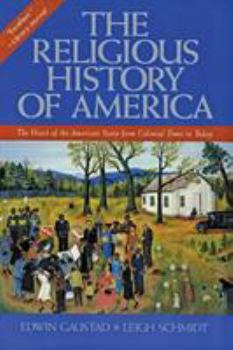The Religious History of America: The Heart of the American Story from Colonial Times to Today
Select Format
Select Condition 
Book Overview
A Dynamic Account of Religion's Central Role in American History
Format:Paperback
Language:English
ISBN:0060630566
ISBN13:9780060630560
Release Date:July 2004
Publisher:HarperOne
Length:464 Pages
Weight:1.14 lbs.
Dimensions:1.2" x 6.1" x 9.0"
Customer Reviews
4 ratings
A Marvelous Tapestry of Grand Arguments
Published by Thriftbooks.com User , 16 years ago
Gaustad and Schmidt weave a gigantic tapestry of stories, heroes, movements, and culture wars, over the whole history of American religious life. A lot of Americans feel their country's history reveals the journey of God's people no less than the history of ancient Israel. And why not? Like that ancient history book, this one captures an epic series of running arguments between revolutionaries, imperialists, feminists, racists, egalitarians, ethnic purists, universalists, legalists, holy rollers or apocalyptic fanatics, all upholding their visions of justice, truth, and beauty. The story Gaustad and Schmidt present meets the literalist criteria of truth, because all those voices really spoke. The book provides a grand overview of the discussion, that helps us choose which voices will shape our lives.
Readble, Interesting and Informative
Published by Thriftbooks.com User , 16 years ago
The author knows his subject and knows how to write as well. Sometimes in academia that is not the case. I have purchased other books by Gaustad. I have found them all to be quality, comprehensive and comprehendable. Enjoyable reads.
A Great Overview
Published by Thriftbooks.com User , 17 years ago
This revision of 'The Religious History of America' by Gaustad and Schmidt is a wonderful and balanced overview of the religious history of the U.S.A., as the title claims. The first review here is very through so I will be brief. These two professors of religion discuss the cultural, political, and economic influences that helped shaped religion in America throughout its history. The book starts with the state of Native American religions before the first colonist set foot on the land. And then properly shows that the first colonies were Catholic and established by Spain and Portugal. The oldest city in the U.S.A. is the Spanish Settlement of Saint Augustine in Florida. It also covers the early expeditions of the French in both the north and south regions of North America. It was only later that the Anglican and English settlements that we learn about in our history textbooks started to form in what we would later call the thirteen colonies. The book then covers topics that include the Puritans in New England, separation of church and state, slavery, the growth of the church in the twentieth century, and the effect that war has on religion. You will read of how the growth of such a great diversity of religion came to be in the U.S.A. This is a very interesting read. This book also has an extensive bibliography for further reading and a good index. This is the book I would choose if I had to teach an introductory course in religious history in America.
A faithful history...
Published by Thriftbooks.com User , 20 years ago
It is somewhat of an historical anomaly that the United States, one of very few major nations in history to be founded on principles of separation of church and state, should have as part of its central cultural, social and political history a prominent strand of religion. This book, `The Religious History of America', by Gaustad and Schmidt, gives a fairly balanced look at the different strands of religious development in the United States divided into four primary time-periods: the Colonial times; the Revolutionary War to the Civil War; Post Civil War to World War II; and World War II to the present. These are broad divisions of American history that are fairly standard (religious history or not). This text was originally written by Edwin Scott Gaustad in 1966; this edition was revised by one of Gaustad's students, Leigh Schmidt, in 2002. The authors address the issue of overkill in certain historical themes from the start - referencing a pop song, they make the case that seeing the beginnings of American religious history as a New England/Puritan event is biased at best - there was a much older settlement in Florida, St. Augustine, but as it was both outside the original thirteen colonies and not a Protestant settlement, it tends to be set aside in favour of the mainstream Protestant origins. Orthodox, Jewish, and other religious beginnings similarly are given a second-class status by `traditional' history timelines and narratives. Of course, this is to say nothing of Native American religious traditions, or the continuation/adaptation of African religious traditions among the slave populations in the colonies and states. The chapters on beginnings thus start with an overview of the state of Native American religions immediately prior to the era of colonisation, as well as the various Mediterranean expeditions (primarily Spanish, but also some Portuguese) into the islands and interior of the Americas. French expeditions north (into Canadian lands) and south (Louisiana) are included here. After this, the Anglican and English establishments in the developing coastal thirteen colonies are discussed in detail, including official Anglican (Church of England settlements), as well as dissident groups (of which the Puritans were but one such group). Different colonies took on different religious complexions; some colonies had `official' religions, but enforcement of uniformity of practice was often beyond the scope of authorities even in the smaller colonies. Before long, the Eastern seaboard of North America was a rich collection of diverse communities, including most major Protestant groups from Europe. It is a common idea that the `founding fathers' of the nation were all religious men; in fact, there was great diversity among them, as was true of the rest of the nation, and even those nominally attached to one tradition had significant variances from their traditions - for example, Thomas Jefferson was officially an Anglican, the





